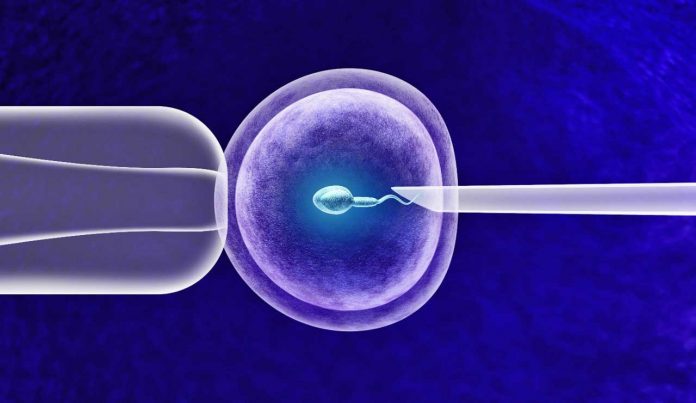Nina Willbach and her wife, a Philadelphia couple, have been trying to get pregnant since last June via assisted insemination. On March 13, they were told that their most recent attempt didn’t work — and they couldn’t try again because COVID-19 had put a stop to “elective procedures” in Pennsylvania. “I know a lot of folks are going through much worse right now, but it feels like a big blow when every month counts, and we’ve had this many nos,” Willbach told me in an online message.
They’re not the only ones to have family-making plans halted during the pandemic — the American Society for Reproductive Medicine (ASRM) on March 17 issued new guidance for its members, recommending the suspension of all new, non-urgent treatments including intrauterine inseminations (IUIs) and in vitro fertilization (IVF; which is also required for gestational surrogacy). Patients who are currently “in-cycle” and have already started a series of treatments may continue them, however.
“We are definitely on a family-building pause right now,” said Kim Bergman, a licensed psychologist, author, and senior partner at Growing Generations, a surrogacy and egg donation agency with many LGBTQ clients. “This is not a law, it is a guideline through the ASRM,” she explained in a phone interview. While fertility doctors don’t have to obey it, “most follow the professional organization’s guidelines.” The impact isn’t restricted to the LGBTQ community, she noted, but affects us because so many LGBTQ people rely on third-party assisted reproduction to start or grow our families.
There are many reasons for the restrictions. “Where there is enforced social distancing, people should not be going into clinics or to doctors for non-essential medical procedures,” she said. Although starting insemination or IVF may feel emotionally essential, she asserted, “It is not medically required that those things happen right now.”
Another reason is that people often use a surrogate or egg donor who lives far away. Bergman explained, “If your surrogate is in, say, Oregon, and your IVF clinic is in California, the normal procedure is that she comes to California, has the IVF transfer, goes back home, is monitored locally in her own hometown by a clinic that does the labs as well as ultrasound follow up, and then is working in concert with the California doctor or wherever the IVF doctor is.”
Now, however, not only is travel restricted, but “all of those local monitoring facilities are closed.” No diagnostic labs are currently doing pregnancy tests because they are all focused on COVID-19. Additionally, “You can’t just walk into a hospital,” Bergman cautioned. “Normally, a lot of our surrogates, for example, have their scans at a hospital facility, but those facilities are completely off-limits right now.” One surrogate who is working with Growing Generations was sent a home pregnancy test by her local clinic — but that’s not a full solution, because normal monitoring goes beyond simple pregnancy detection. Usually, third-party assisted reproduction cycles “are really precise, well-controlled, and managed,” Bergman explained. Doctors need to track things like progesterone levels that help them assess the progress of the pregnancy, something they can’t do in the current circumstances.
“If you go forward with a cycle that’s not optimal, you’re still spending the same amount of money,” she noted. It’s not just about the money, however. She’s had many conversations in the past week with clients whose cycles were canceled. “It’s so disappointing and they’ve waited so long,” she said. “There were definitely people who pushed back, saying ‘Please, let’s go forward, I’ll take the risk.’ But it’s not their risk to take. They’re risking the surrogate, they’re risking an embryo, which they may not have many of, they’re risking the money, so we’ve had to say, ‘We understand emotionally you do not want to stop, but stopping is in your best interests.’”
The ASRM said it will revisit its guidance “periodically as the pandemic evolves.” Bergman said this reassessment might be as often as every two weeks. She noted, “Everything is geared up so that as soon as things are safer and we get a green light, there’s going to be tons of cycles, more than usual.”
In fact, some of Bergman’s clients who hadn’t felt quite ready to begin have recently told her that the pandemic has given them a new perspective, saying, “Now I see what’s really important in life. It’s me being a parent, and I want to go for it.”
Of course, anyone wanting to use third-party assisted reproduction will have to wait until the restrictions lift. In the meantime, Bergman offered the words of comfort she gives anyone going through infertility or the IVF process: “It will happen. You will be a parent.”
She added, “In the marathon of family building, you’re going to have some really exhilarating miles, some really hard miles, some tedious miles, some boring miles, some joyful miles. Every mile’s different, and it’s a really long road. This happens to be probably one of the hardest miles we’ve ever had, collectively, but like any marathon, we will get to the finish line. People will still be mommies and daddies and people will have their families.”
Dana Rudolph is the founder and publisher of Mombian (mombian.com), a GLAAD Media Award-winning blog and resource directory for LGBTQ parents.
Ask questions, get answers about COVID-19
